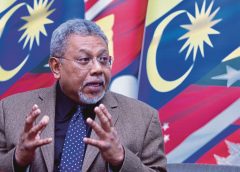Dr Ramlan injects good health into Malaysian sports
It’s common knowledge in Malaysian sports that one has to play “sports politics” to survive the system.
But not in the case of Datuk Dr Ramlan Abdul Aziz.
He rose from rank and file to become an eminent member of the sports medicine community apart from being a recognised sports administrator.
However, Dr Ramlan also faced betrayals and disappointments in his 32 years of service.
A former head of the National Sports Council (NSC) and the National Sports Institute (NSI), he retired as senior consultant sports physician at 60 on April 21 from NSI.
For Dr Ramlan, his happiest moments were at the grassroots, working with enthusiastic athletes and sincere sports officials.
A down-to-earth person despite his high positions, he always has time and an ear for everyone.
Being a medical man, administration was not his forte though he tried to manage to the best of his ability.
Aware of his limitations in administration, Dr Ramlan brought in people with expertise to assist him. But sadly many undermined him.
He trusted them, and gave them opportunities but they became opportunists to his detriment.
Despite being led on the wrong path many times by those with no good intentions, Dr Ramlan never had a bad thing to say about them.
But his medical forte did not go unnoticed as he became a respected figure internationally.
Dr Ramlan sits in various international and national committees such as the Health and Safety Committee of the International Hockey Federation, the Medical and Sports Science Committee of the Asian Paralympic Council, and the Medical and Anti-Doping Committee of the Olympic Council of Malaysia. He was also a member of the Health Ministry’s Specialisation Committee for Sports Medicine and Rehabilitation Medicine which vets and approves applications for specialist recognition in Malaysia.
There were attempts to discredit or remove him from his positions by those with ill intention but the good doctor never used his “connections” with people in power in response.
When asked why he did not use his “connections”, Dr Ramlan replied: “I want to be recognised by my merits and not trying to stay in positions, using my connections.
“If people want my position, let them have it. I can still contribute in many ways to sports which is always close to my heart.”
You can say his humble upbringing, his father was a barber, had a lot to do with Dr Ramlan’s unassuming character.
Many may not know it. Dr Ramlan is also an accomplished musician who plays the guitar and drums. His younger brother is the famous music composer Roslan Aziz. And Dr Ramlan still has a band, comprising fellow students of MCKK.
In writing his profile, Dr Ramlan said: “It hit me at the end… how much that I had done. Certainly it wasn’t all good or the best of me at all points but it just left me with a sense of ‘Did I do all that… and how did I find the time and energy to do those things?’
“I don’t worry about being forgotten for my own sake but at least for my family, whom I had neglected quite often at various points along the way… just to get some sense that all that missed love and comfort was not in vain.”
Dr Ramlan’s long and storied career in sports medicine is highlighted by six Olympics with the Malaysian contingents, from Barcelona, 1992, to London 2012, five of which he served as chief medical officer. He was also the doctor for the national hockey teams for 16 years.
He was director of the NSI from 1996 to 2005, Director General of the NSC (2005-2007), Director General and later Chief Executive of the NSI from 2007-2016.
Even as NSC Director General, he found time, in between, to serve as doctor for the national badminton team, working with illustrious players such as Lee Chong Wei.
Dr Ramlan was involved in medical care and high performance scientific service management for the badminton squad in the Thomas Cup and other world level tournaments from 1996 to 2006. He was also active in the Asian Games, Commonwealth Games and Sea Games.
While helming the NSI, he also helped in the rise of several sports, working closely with world-class coaches John Beasley in track cycling and Yang Zhuliang in diving.
And Dr Ramlan, who was Malaysia’s Chef-de-Mission at the 2009 Sea Games in Laos, never neglected the so-called “smaller sports” like archery, karate, taekwondo and para-athletics, as he firmly believed in helping others through sports science.
Dr Ramlan, who was also Director of the Anti-Doping Agency of Malaysia (2017-2018), is now writing a book on the country’s Olympians, and it will be unveiled before the Tokyo Olympics.

